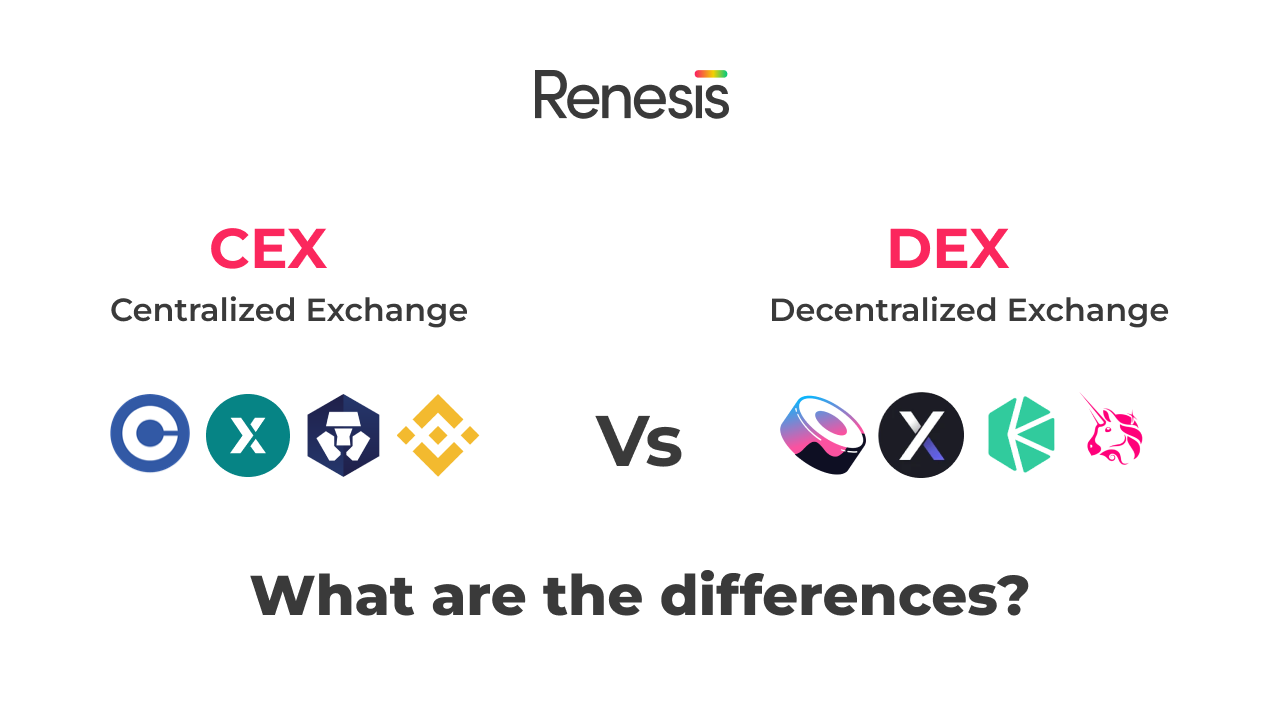Centralized Exchange (CEX) vs Decentralized Exchange (DEX): What are the Differences?
A crypto exchange is the most likely place to go when you’re considering buying or selling crypto. Crypto trading is primarily conducted on these digital marketplaces. Most of you have probably heard of Binance, Kraken, and Uniswap. Decentralized exchanges are expected to grow rapidly in the next few years, according to many blockchain enthusiasts. Decentralized versions of some well-known cryptocurrency exchange platforms are also being developed to distinguish between various transactions. Will cryptocurrency trading truly decentralize in the future?
For anyone interested in crypto assets, cryptocurrency exchanges serve as gateways. You can purchase and sell cryptocurrencies through crypto exchanges. However, the Centralized Exchange vs Decentralized Exchange debate has been making headlines in crypto news for valid reasons.
Before we understand what the difference is, let’s review the theory surrounding Decentralized Exchanges (DEX) and Centralized Exchanges (CEX).
What are Crypto Exchanges?
In a nutshell, crypto exchanges are the stock exchanges of the crypto world. In the same way that you can purchase and sell shares and derivatives on stock exchanges, crypto exchanges let you buy and sell blockchain-based tokens and coins.
Cryptocurrency exchanges can be classified into two types: first-generation platforms, which are more centralized, and decentralized exchanges, which have just started to emerge.
Though both CEX and DEX offer crypto trading functionality, they differ in many other aspects. For instance, transactions depend on the type of exchange. Both types of exchanges also differ significantly in terms of features for the user and flexibility. It is therefore important to have a fundamental understanding of the two types of crypto exchanges before attempting a comparison.
What are Centralized Exchanges?
There are a number of centralized exchanges with their own order books, including Binance, CEX.io, Kraken, Coinbase Exchange, and OKEx. All cryptocurrency transactions are recorded and authenticated in the order book. Internally, the information is passed through an efficient network and protected by consolidated security measures.
The protocol requires CEXs to operate under a know-your-customer policy that is extensive and built into the protocol itself. To prevent financial fraud, centralized exchanges vigorously prosecute fraudsters in accordance with existing laws.
Centralized exchanges function almost like banks. Several of them (such as crypto.com) offer crypto cards that can be used in physical shops, you can trade on their platform and make investments, and they offer various financial services (leveraged trading is perhaps the most well-known and widespread).
What are Decentralized Exchanges?
The blockchain-platform-based decentralized exchange enables anyone to trade digital assets safely and openly without intermediaries. In addition to having all the capabilities of a centralized exchange, a DEX makes it easier to exchange all of the currencies available online. In this way, traders won’t need to worry about limiting coin listings on DEXs.
A DEX is commonly built on the Ethereum network and uses Ether (ETH) as its currency. There is a possibility of using other cryptocurrency coins as a framework base, but Ethereum is by far the most popular on the financial markets. This is why they aren’t based on transfer prices, and they don’t follow a single platform either.
Let’s now look at what separates decentralized exchanges from centralized ones.
Differences between CEX and DEX
Custody of Assets
Trading on centralized exchanges requires placing your assets in the custody of the exchange before you begin. Decentralized exchanges allow you to hold your assets with exclusive control. The non-custodial nature of decentralized exchanges also calls for greater attention to the security of your private keys.
Impermanent Loss
Using a decentralized exchange with liquidity pools makes crypto trading a lot more convenient. However, the advantage of decentralized exchanges over centralized exchanges might have a prominent underlying risk. In decentralized exchanges, liquidity providers are often exposed to impermanent losses.
Instead of withdrawing the number of tokens, they invested in, liquidity providers can only withdraw their share in the value of the liquidity pool.
Security and Privacy
Compared to a traditional exchange, CEXs are less likely to expose you to scams. Scammers run away with millions in crypto assets after people buy unknown coins and lose their entire investment because the project turns out to be a fake.
There’s no way to fix a scam in the DEX world. Also, since you own your wallet, if you forget your password and your seed phrase (a set of random words that only you know), you can’t reset the password.
CEX vs DEX debate shows that decentralized exchanges still have a long way to go. A decentralized exchange offers an obvious advantage over a centralized exchange. As an example, there is no KYC verification required or any pressure to entrust your crypto assets to the exchange. Decentralized exchanges have the potential to transform cryptocurrency ownership and trading in the future. Learn more about cryptocurrencies and explore the implications of crypto exchanges.










